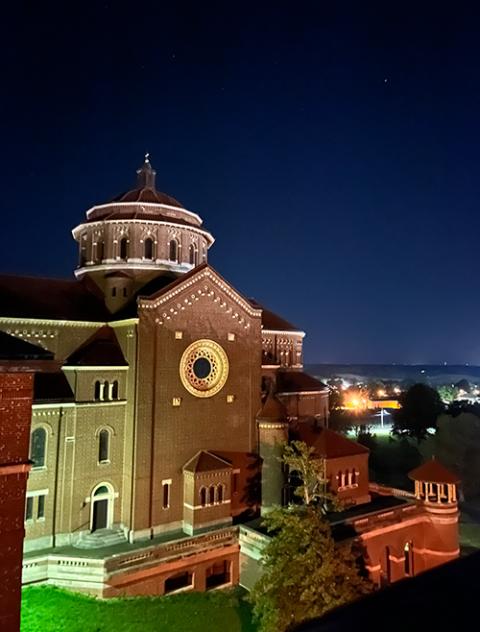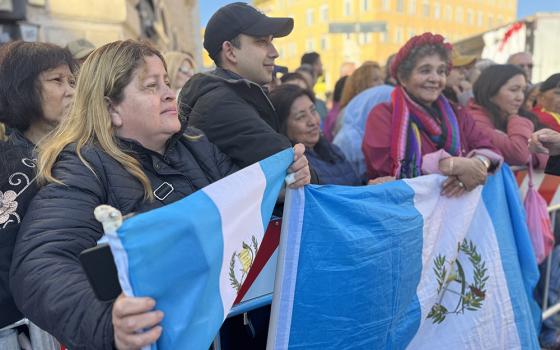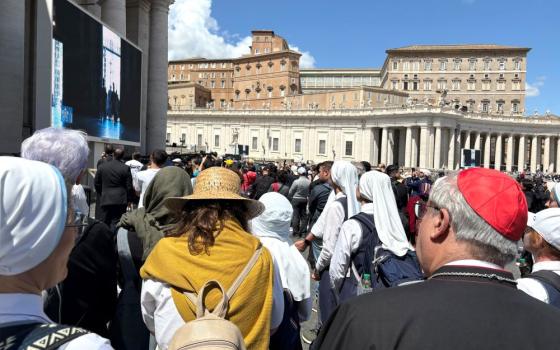
The aurora borealis is seen in Washington state in May 2024. (Wikimedia Commons/RailworksAmerica)
In a world where the pace of life due to ministry and multiple congregational commitments often precludes meaningful connection, we asked sisters:
What traditions or practices in your community create space for others?
This panel explores how communities of religious women engage in traditions and practices that foster inclusivity, create space for others, and enhance communal and individual well-being.
_____

Charity Bbalo, a Religious Sister of the Holy Spirit from Zambia, serves as the research and capacity development coordinator at the Centre for Research in Religious Life and Apostolate (CERRA). She obtained a bachelor of arts in education (English and religious studies) from the University of Zambia and a master's degree in multicultural and international education from Oslo University College, Norway. She has served as a senior lecturer in a teacher training college and now serves as deputy principal in a girls' high school. She is passionate about researching issues related to religious life, women and the girl-child. She enjoys reading novels and academic articles and writing.
In a world where life is fast-paced with many deadlines to meet, it is easy to be engrossed in one's work and forget about the welfare of others. With this in mind, the Religious Sisters of the Holy Spirit promote traditions that help the sisters balance work and the conscious practice of creating space for another.
One of these practices is silence upon waking up in the morning and in the evening before retiring for the night. Since it is almost impossible to find time for reflective silence during the day, these designated moments of silence provide an opportunity for personal prayer and reflection. The silence also offers space for inner calmness and processing one's thoughts and experiences of daily life.
Our 2019 General Chapter document urges us to "create a conducive environment for sharing in communities." In order to promote this culture of sharing and listening to one another, we share our personal stories and experiences not only at community prayer, but at recreation and at meals as we consciously take turns to speak and to listen in a less formal setup.
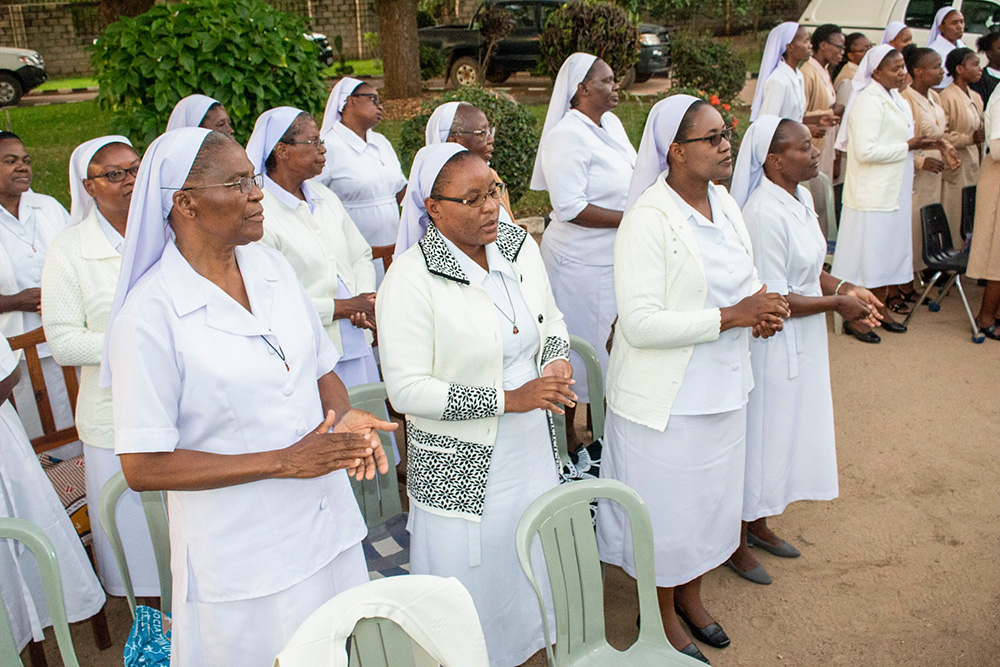
Religious Sisters of the Holy Spirit attend Mass for Pentecost on May 19 at Moreau House in Mazabuka, Zambia. (Courtesy of Religious Sisters of the Holy Spirit)
This gives us an opportunity to walk in another's shoes and be less judgmental by showing that we care about what the other has gone through. In this way, the other person feels seen and heard.
When we interact with empathy and understanding with fellow sisters, we become more empathetic and understanding toward those we minister to.
The practice of hospitality in our communities is one other tradition that fosters the creation of space for self and others. Our founder, Bishop James Corboy, urged sisters to take short holidays to communities other than their own, "for the sister to have a break from her community members and for the community to have a break from the sister!"
By stepping aside from the usual daily routine, the sister is provided an opportunity to rejuvenate physically and mentally, thereby helping her relate better with others and see them as individuals uniquely loved by God.
Creating space for others is not always an easy task, as we all have our own personal issues to deal with, including ill health and stress. However, every set activity yields fruit only by making an effort toward attaining it.

Julian Cleary is a member of the Benedictine community of St. Placid Priory in Lacey, Washington. She is a licensed attorney, having worked for many years with adults and children with disabilities before entering the monastery. She has occasionally advocated for detained refugees and hopes to be more involved with this ministry in the future. Her current ministries include work as a spiritual director, participating in the monastery's health care team (she is a former nurse practitioner), liturgy committee, grant-writing and other projects.
In 1992, St. Placid Priory created a Spirituality Center for retreats and diverse program offerings. For 32 years, the center has been a sacred space for quiet contemplation. The monastic grounds include trails and open spaces for walking, sitting, or simply being. Feedback from guests highlights the inner space created by the surrounding silence.
"Space" has various meanings and can be a noun, verb or adjective. Here, it refers to a place, both interior and exterior, providing a spacious environment for retreatants and guests to expand their worlds.
Advertisement
The center also hosts programs that create space for participants, including prayer practices, spirituality themes, ecology, social justice, movement, song, poetry, literature, photography, creative arts and more. The possibilities are nearly endless.
The center also provides space for the St. Placid Priory community. Sisters may use it for private time, retreats, spiritual direction, and offering or participating in programs.
In community, sisters offer each other space through listening and silence. Effective listening involves hearing with the heart, being present and refraining from speaking. Silence creates the space for another to speak and just be, reflecting their dignity and importance. Listening and silence are interconnected. It is no accident that "listen" and "silent" are composed with the same letters.
I've been pondering something I have named "incarnating spaciousness." Here, spaciousness is an adjective and incarnating a verb, meaning to give human form to the embodiment of Christ's divinity and humanity, creating inner spaciousness uniting Christ with those seeking spaciousness.
Creating and offering incarnating spaciousness turns space into a kind of Eucharist, making it sacred with the presence of Christ.
Offering this incarnating spaciousness to oneself and others is offering the embodied Christ. This can transform us, similar to transubstantiation, where bread and wine become the body and blood of Christ.
Creating and offering incarnating spaciousness turns space into a kind of Eucharist, making it sacred with the presence of Christ.
A recent experience of the aurora borealis in western Washington exemplified incarnating spaciousness — merging the human world with divine light creation. At Christmas, the Word became incarnate. Recently, we celebrated the Solemnity of the Body and Blood of Christ — the Word becoming flesh.
Let us offer each other incarnating spaciousness.

Kathleen Noelle Cummings is currently a novice at Monastery Immaculate Conception, a Benedictine monastery in Ferdinand, Indiana. Before entering the community, she worked in communications at the University of Wisconsin, in marketing for an academic publishing house and taught music. She enjoys reading, writing and discovering how God is present in the moments of everyday life.
Approximately 100 sisters live in our Benedictine community in Ferdinand, Indiana. Most reside in the monastery and a few live in community in other cities that are close to their jobs and places of ministry.
One of the easiest pitfalls a community can fall into is insularity. It's so easy to focus solely on daily life lived within the monastery and become disconnected from the needs and realities of people outside. When the community becomes self-absorbed, it loses the energy of mission and love that animates religious life.
In Evangelii Gaudium from Pope Francis, he says, "We have to state, without mincing words, that there is an inseparable bond between our faith and the poor. May we never abandon them."
So how does my community stay connected to the needs of our local poor? One way is through our Blessing Cabinet, a small food pantry for nonperishable items. Employees are welcome to take food for themselves or for other people they know. Sisters buy food from a discount grocery store for the pantry and also provide grocery shopping gift cards to people as needed.
Our religious community also provides a weekly meal at a local home for women recovering from substance abuse.
Interpersonal and spiritual connections are important for everyone's well-being. A few of our sisters who need a high level of health care reside at a nearby nursing home. Other sisters visit the nursing home every single day, not only to care for our sisters there but also to provide a listening ear, daily evening prayer, distribution of Communion, and friendship to all the residents.
Visitors frequently come to see our church, as it is a tourist attraction, and are welcome to share prayer requests or talk to a sister. At our hospitality center, we offer lodging and guided or silent retreats to visitors from all over the country.
Volunteers and oblates also frequently come to the monastery to participate in projects, prayer or learning opportunities.
What are some other things that can be done to welcome others? We can pray locally — asking folks in the city or town near us what prayer they need. We can be good neighbors, participating in town festivals and service projects. And we can offer our presence at parish celebrations of feasts, funerals and other important events.
I'll end with another quote from Pope Francis, in his message to the Jesuit Refugee Service, on Sept. 12, 2013: "To serve means to recognize and welcome the demands for justice, for hope, and to seek ways together, a concrete path of liberation."
As vowed religious may we always create space for others, especially the materially and relationally poor, in our community.
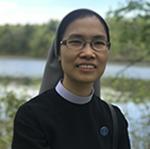
Maria Yen Do is a member of the Sisters of Mary, Queen of the World in Vietnam. She has been working for years as a catechist and kindergarten teacher and serving as an organist and choir director in various faith communities. She previously taught English to novices and catechism to postulants in her community. She came to the United States to pursue higher education and is currently working toward a doctorate in religious education. Upon completing her studies, she hopes to serve her community and the church in Vietnam.
"Are you going to Brockton?" This question is often asked by Vietnamese sisters who have lived with the Sisters of Jesus Crucified in Brockton, Massachusetts.
Many of us have considered this community our home during our studies in the United States, and now we look forward to returning for our Christmas or summer break. In this communal home, we have been able to develop ourselves and our relationships.
For higher education, many religious congregations in Vietnam have sent their younger members to the United States. We are welcomed by different religious communities across America. Several years ago, I arrived in Brockton and stayed with nine Sisters of Jesus Crucified and eight other Vietnamese sisters.
Before me, the Sisters of Jesus Crucified welcomed several Vietnamese sisters, who were transferred elsewhere for higher education. Since then, the community has continued to welcome many groups of sisters from different religious congregations from North, Central and South Vietnam.
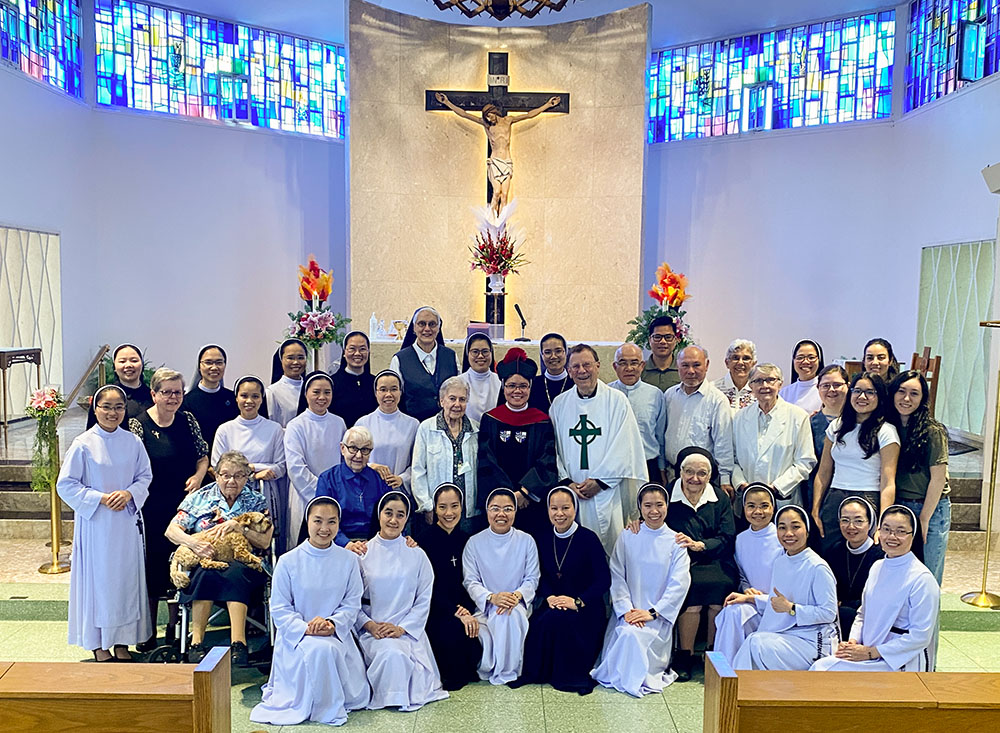
The Brockton community poses for a photo to celebrate one of the Vietnamese sisters graduating from a doctoral program in May 2024. (Courtesy of Maria Yen Do)
The Sisters of Jesus Crucified community takes care of us in many ways. They generously provide us with plenty of vegetables and fruits, in addition to American food. They help us to get health insurance and driver's licenses and provide volunteer English teachers for us.
Yearly, they extend their welcome to many other Vietnamese sisters, brothers and priests for a summer retreat with free meals and accommodation at their beautiful convent. Their hospitality makes us comfortable to bring our own Vietnamese guests to the community.
Our Vietnamese sisterhood has grown during our stay in this community. We have opportunities to practice our culture, including traditional dancing and cooking Vietnamese food with fish sauce. However, we are not allowed to speak Vietnamese since we must learn English!
'Your generous love allows us to tangibly experience the boundless love that God has for each of us.'
Opportunities to study, do chores, and have fun together gradually strengthen our bonds. The intimate connections between the sisters and the community make those who live faraway look forward to returning home. Most of us feel that we belong to this large and diverse community and feel comfortable in our home.
Although only four of them remain, the Sisters of Jesus Crucified continue to show their love is restless and boundless, keeping their doors open to welcome anyone.
Sr. Ruth Dauginikas, a Sisters of Jesus Crucified first council member, delivers a brief formal speech in gratitude to Vietnamese sisters on some occasions. In response to her speech, my heart echoes: "Yes. But you deserve many more thanks from us. Your generous love allows us to tangibly experience the boundless love that God has for each of us."
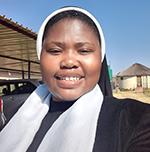
Agnes Motake, of Lesotho, is a member of the congregation of the Sisters of Holy Names of Jesus and Mary in Lesotho province. She joined the community in 2014 and professed her final vows in 2022. She has worked in ministries including teaching preschool and computer at SNJM College and working as a secretary at Holy Names High School. Currently, she is a third-year university student, studying for a bachelor's degree in education.
Imitating our founder, Blessed Marie-Rose Durocher, as we say, "We are Marie-Rose yesterday, we are Marie-Rose today," we discern the signs of the times. Thus, we work or do what we have to do according to the needs of the world we are living in.
The community of Sisters of the Holy Names of Jesus and Mary is known for creating space for others through traditions and practices that promote inclusivity, social justice and education. Hence, the sisters are known for their dedication to serving others, especially those marginalized by society, and their commitment to living out the teachings of Jesus and Mary.
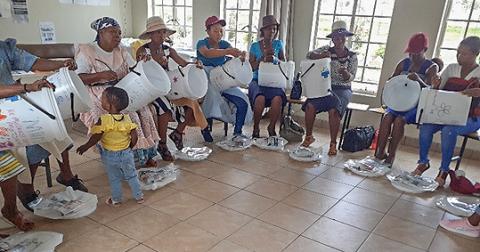
Sisters provide filters for breastfeeding mothers for access to clean water. (Agnes Motake)
More prominently, the community is also creating safe space through the new leadership structure of a progressive change model, where everyone is included and we are all united.
One of the key traditions of our community is our commitment to education. The Sisters of the Holy Names of Jesus and Mary have a long-standing history of providing quality education to children, regardless of socioeconomic status. Therefore, we have established schools throughout Canada, the United States and Lesotho, offering a holistic approach to education that focuses on the development of the whole person — mind, body, and spirit.
Through our schools and other educational initiatives, we have created space for individuals to learn, grow and achieve their full potential.
This commitment to education reflects our congregation's belief in the transformative power of knowledge and the importance of providing equal opportunities for all and providing a nurturing and inclusive environment for students of all backgrounds.
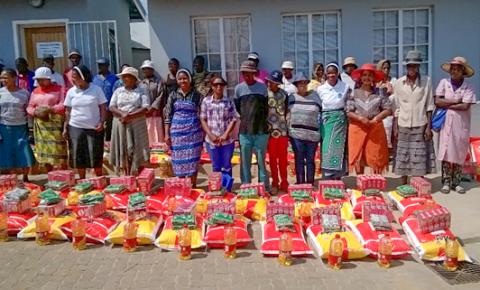
Sisters help the people with parcels of food. (Agnes Motake)
Equally important, my congregation is also known for its commitment to social justice. Inspired by the teachings of Jesus and Mary, we sisters work tirelessly to advocate for those who are marginalized and oppressed in society. We are actively involved in various social justice initiatives, such as advocating for the rights of immigrants, fighting against human trafficking, alleviating poverty, and promoting environmental sustainability.
Through our actions and advocacy, my sisters create space for others to voice their concerns, seek support, work toward a more just and compassionate society, and ensure that the voices of individuals are heard and their needs are met.
Further, the impact of the traditions and practices of the community is widespread and enduring. Our educational institutions have empowered countless individuals to become leaders in their communities and make a positive impact on society. Our commitment to social justice has inspired others to take action and stand up for the rights of the marginalized. My congregation also takes into consideration people who are disadvantaged by visiting the sick, prisoners and helping the poor.
Overall, my community's traditions and practices continue to create space for others to thrive, contribute and make a difference in the world.

